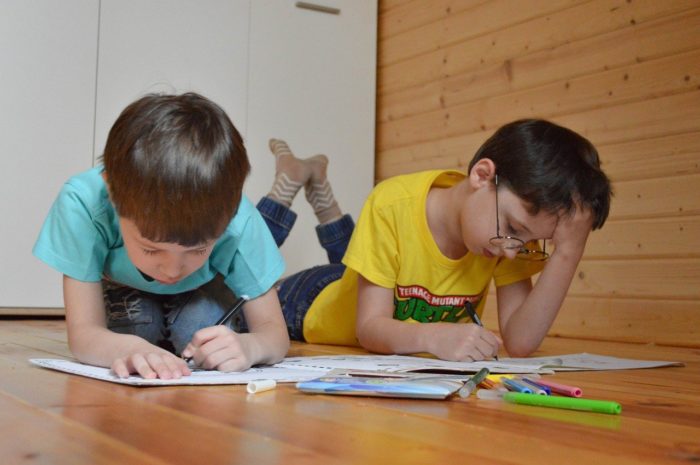Sure-Proof Ways Not to Get Mad at Your Own Kid
This is it. You’re mad at your own child. Why? Because you’ve spent the last 2 months with him/her. All-day long every day. And every day a child needs something. And every single day they don’t want to do what you say. And every day you hear: “mama this, mama that”. And it irritates you. The mess in their rooms drives you crazy. They don’t want to learn, and homeschooling will last for at least a few weeks more. We’ve been there too. How to keep calm? After all, it’s just a child. Your beloved child!

Why yelling is not an option
Yelling at a child is psychological violence. Moreover, it doesn’t bring anything good, it’s destructive. It won’t make them understand anything better. It won’t make them more successful in later life. They won’t love you more. It won’t make them happier or healthier. A yelling parent is helpless. Before you make it a habit, try our tips below to stop yelling:
Leave the room
The most important thing is to leave the situation. If you’re about to start yelling, leave the room. You’d regret screaming at your child after anyway. So if you’re not there, you won’t do yell. Go to the bathroom, close the door. You could even let some tap water run (but not too much, we still care for the environment!). Listening to the water falling down has a calming effect.
Count to 10
As simple as it may sound, count to ten. When you feel you’re just one step from starting to yell, stop, close your eyes, close ears with your hands, and count slowly. If it doesn’t help, count to 20. Take your time. It will distract you from the things that made you mad. You’ll feel better.
Practice breathing exercises
Breathing deeply makes your mind clearer and calms you. When you’re starting getting mad, leave the room and take a few minutes to make some breathing exercises.
Breathing is very important to any human being. Breathing deeply to your belly provides your body and mind with more essential oxygen. You’ll feel better. We’d recommend breathing exercises with an open window.
Lay down or take a sit. Breathe in deeply and slowly while counting to 3, hold for 3 to 5 counts, and slowly release counting to 3. Repeat the same counting to 4, then 5, and so on – as long as you can. If 6 is your maximum, no problem. Get back to 5, then 4, then 3 and 2 counts. Even 5 minutes will be enough.
While you’re breathing in, feel your belly filled with fresh air and your ribs open. You’ll probably start yawning. That’s totally fine. Do you feel better now? Now go back to your child and start explaining that Maths topic again.

Think how unhealthy it is to get mad
You might think, it’s OK to scream at times. And if the fact that it’s unhealthy for your kid is not enough, think about your own health.
When a person is mad, the heart rate and arterial tension increase. This happens due to adrenaline getting released. If you’re in danger that’s good. But if it’s just an argument with a child (happening frequently), it affects your well-being. Every time you’re stressed and feel like yelling, think what harm it could do to your health. Those in chronic stress often get ill because of the long-term activated stress-response. The consequences are, for example:
- diabetes,
- anxiety,
- depression,
- sleep problems,
- weight gain
- muscle weakness,
- skin problems and many more.
If could work for some people to simply think of all the health risks of getting mad regularly – and they’ll prevent themselves from it. After all
And this brings us to the next step:
Make a commitment
You can even write it down and sign. Make a commitment to never yell at your kid again. No matter what. It’ll be tough at times, but, just like any other habit, you can work on developing it. As time goes by, you’ll learn to solve conflicts without raising your voice.
Don’t let your child provoke you
Kids will push your buttons. If a particular behavior drove you mad before, they will try it again. Especially if it could give them some more time NOT studying or doing other things they don’t like.
As soon as they understand it’s not working anymore they will stop. The most important thing for you is to learn not to react. Eventually, they’ll lose interest in doing it.
Get control back

For God’s sake, it’s your own body! Don’t let those little creatures who wet their pants just a few years ago influence your moods and reactions! Get control over your body back. Learn to ignore and live your own emotions independent of the kids’ behavior.
Don’t make yourself responsible for everything
You’re responsible for a baby who can’t walk or eat by themselves. But if your kid is 11 and needs help doing homework, help them without doing it for them.
You have your own responsibilities, but your child has their own too. Don’t solve all his or her problems. Provide support or a helping hand, but remind them they also have things they should do without your help.
If they fail, it will be their failure to learn from. Don’t get anxious for someone else. Don’t be a control freak and let your kid make their own mistakes and learn from them. Controlling everything and striving for everything to be perfect will only cause more stress during this time already full of anxiety.
Let more things go.
Use the good-old autogenic training
Say to yourself: “I’m calm, I can handle this, I can bear this, it’s not that important, there are much worse things to think about or get angry at”. Just be positive with yourself, and your reactions will be much less destructive.
Know the most critical times
For some, it’s before going to bed or when studying is about to start. But in every family, there are times of the day or week when the atmosphere is most stressful. Know when these times are and what triggers these situations and get emotionally ready for them or try to prevent them.
You’ll see that your reactions are getting better and you – calmer.
Instead of the conclusion

We often take relatively small problems too seriously. We see this in our friends or other people, but while we’re in this paradigm, we can’t reflex and analyze it at times. And if things turn out differently than expected, we get mad. There are two simple ways how not to get mad:
- Have fewer expectations
and
- Think if this is still going to be important in 10 years.
If not, then why getting mad about them?
